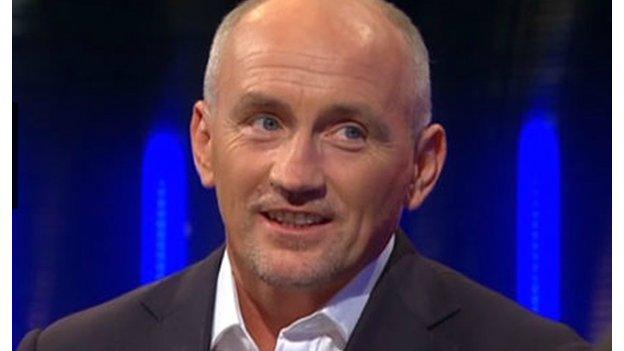Barry McGuigan explains Cuban boxing success
- Published

Barry McGuigan
As Cuban teenager Robeisy Ramirez Carrazana defeated Mongolia's Tugstsogt Nyambayar to win the flyweight gold medal at London 2012 he was carrying on a rich boxing legacy.
Cuban boxers are the most successful in the history of amateur boxing, with each generation producing a host of world-class fighters..
Cuba has won 32 Olympic boxing gold medals since 1972, more than any other country, which is all the more remarkable given that they boycotted the 1984 and 1988 Olympics.
Former boxing World Champion Barry McGuigan, who fought for Ireland in the 1980 Moscow Olympics and is at London 2012 working with LOCOG (London Organising Committee of the Olympic and Paralympic Games), has been assessing what makes Cuban boxers special.
"Cuban boxers are genetically predisposed to boxing. Their genetic make-up aligned with the volatile Latino temperament, world-class trainers and iron discipline make for an explosive combination," explains McGuigan.
McGuigan thinks it is no coincidence that there are so many world-class Cuban fighters in every weight division.
"The Cubans all look bigger than everyone else in their division. They train at the highest level with world-class coaches. They have the perfect fighting physique: tall and lean with broad shoulders."
Ban on professional boxing in Cuba
In 1962, professional boxing in Cuba was banned by Fidel Castro. So amateur boxing reigns supreme in the country. Successful amateur boxers are regarded as superstars.
McGuigan maintains there is a real incentive for Cubans to excel in the sporting arena:
"In a country where resources are limited, promising boxers are brought into a camp, trained and educated and their families well looked after. Boxers are schooled in an almost military style environment where discipline is paramount."
As a consequence of Castro's ban, if fighters want to pursue their dream of becoming world champion they have to make the heartbreaking decision to defect from the country and McGuigan says this decision can have a profound effect on fighters.
"It can be very tough for them because they are excommunicated and separated from their families."
In tough economic times, with promoters hungry for new talent, it is difficult for all Cuban fighters to follow the example of three time Olympic champion Teofilo Stevenson, who famously turned down the opportunity to earn a million dollars by becoming a professional and fighting Muhammad Ali.
McGuigan feels if the ban was lifted we would see many Cuban fighters winning world titles due to the abundance of talent at their disposal.
"Prior to the ban Cuba had some famous world champions including the legendary 'Kid' Chocolate, external, who was a national hero. I have no doubt they would win a number of world titles in the future."
Guillermo Rigondeaux
McGuigan points to Guillermo Rigondeaux , externalas a Cuban boxer who's decision to defect has been vindicated by his success as a professional. Rigndeaux, who had an amateur record of nearly 400 fights, won the bantamweight gold medal in the 2000 and 2004 Olympics.
In 2007 he made a failed attempt to defect from Cuba and was subsequently banned from the Cuban team and was not allowed to participate in the Beijing Games.
In February 2009, Rigondeaux successfully escaped from Cuba via a speed boat to Miami. He has enjoyed great success since turning professional, is the current WBA Superbantamweight World Champion and is rated as pound-for-pound one of the world's best fighters.
McGuigan says: "I don't know when the ban on professional boxing will be lifted in Cuba, it depends on their politics. But I do hope there will be a loosening of the rules that will allow more Cubans to fight professionally because fans around the world would love to see them fight more."
Why the Olympics is the pinnacle
McGuigan is delighted to be involved in London 2012.
"The Olympics is the biggest sporting event in the world. It has been the starting point for many of the great names in boxing."
London 2012 has given him the opportunity to reflect on his own experience of amateur boxing.
"I loved fighting as an amateur and being part of a team. When guys in your team win medals it is the most amazing buzz for everyone involved. The happiest time in my career was fighting as an amateur, with the highlight being my Commonwealth Gold in 1978."
The 1980 Moscow Olympics, however, ended in crushing disappointment for McGuigan, as he felt he was the victim of a bad decision when he lost to Zambia's Winfred Kabunda in the third round.
"That was the moment I had worked my entire amateur career for, so it was heart breaking to be robbed. I'm not the only one to have suffered that fate - just ask Roy Jones Jr, external (Jones lost a controversial decision to his South Korean opponent in the light middleweight Olympic final in Seoul in 1988)."
While many boxers have used the Olympics as a springboard for a successful professional career, McGuigan used the painful defeat as motivation to drive him on to become World Champion.